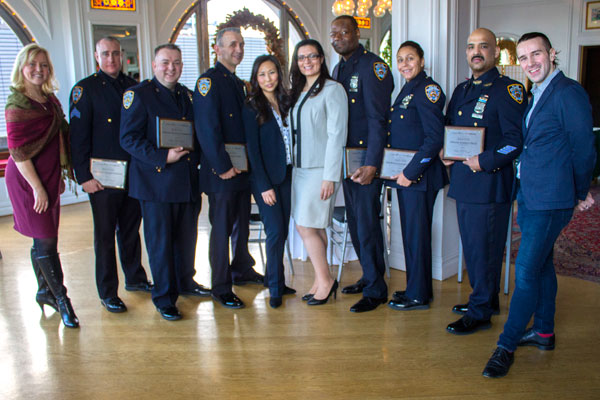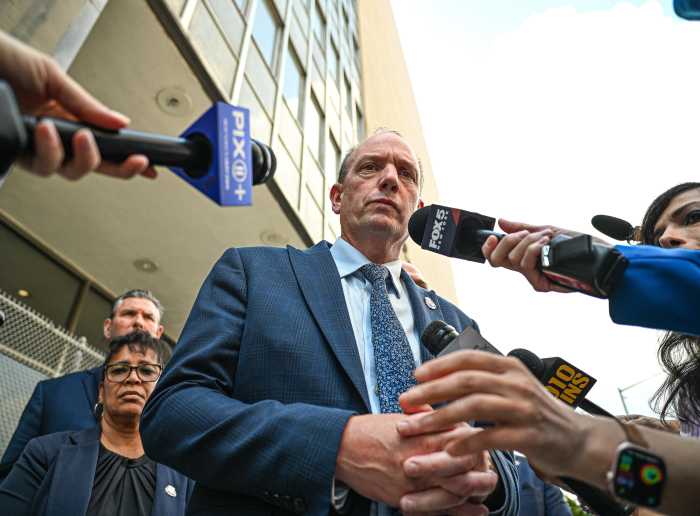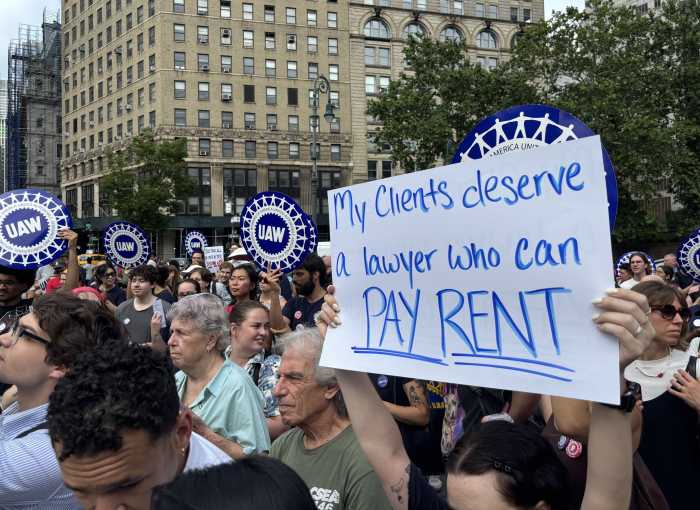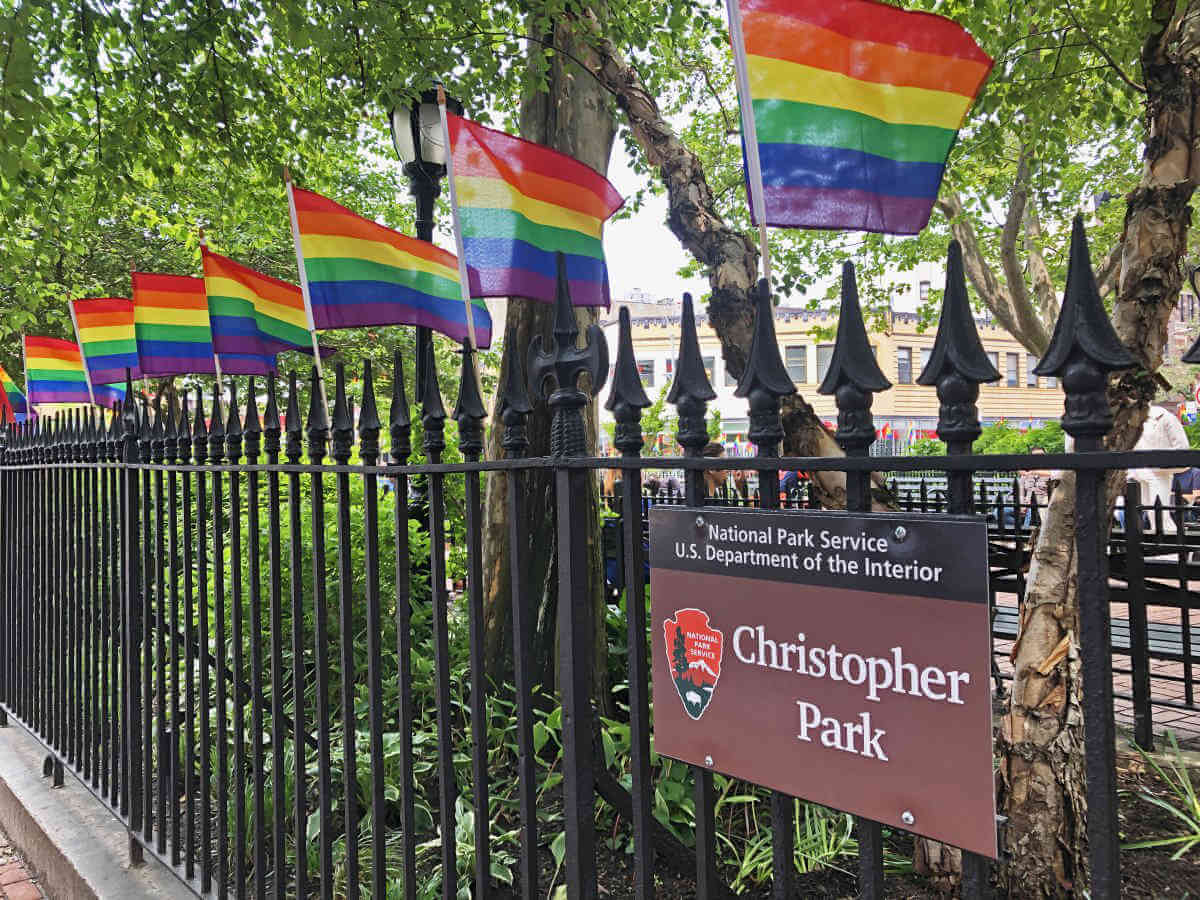
Teens interested in applying for community board positions debated the best way to spend $100 million of public money during an exercise in Borough President Gale Brewer’s office last Friday.
BY DUSICA SUE MALESEVIC | It had all the makings of a typical teen party — pizza and soda, excited chatter, and of course, young people. But it was no party, but rather a meeting to discuss a serious commitment that some adults would shy away from: serving on a community board.
Late last Friday afternoon, Manhattan Borough President Gale Brewer hosted an informational session for young people interested in serving on their community board. At Brewer’s urging, Gov. Andrew Cuomo signed a law last summer that allows 16- and 17-years-old to be members of a board.
As the application for this year draws almost to a close — Jan. 30 at 5 p.m. is the deadline — this will be the first time that teenagers can apply and be legally appointed.
In a packed room at her office at 1 Centre St., one of the hopefuls, Heebong Kim, a 17-year-old student at Battery Park City’s Stuyvesant High School, said he wants to apply to Community Board 1.
“I never felt that I had political capital,” he told Downtown Express. “Especially as a youth where no one votes, I felt like the political scene was really dominated by older persons.”
Passionate about environmental science, Kim lives in Flushing, Queens, but wants to serve in Lower Manhattan and has already gone to Board 1 meetings.
“I didn’t feel that government had a place for me,” he said. “To have a more active role in that process would just be incredible — especially at 17. I never thought I could do this even at 18.”

Brewer started the meeting by talking about the long road that led to the passing of the legislation. A former community board member for ten years, Brewer said the idea started when she was a city councilmember and thought about having teenagers younger than 18 vote.
“We should have young people vote in city elections,” she said. “The adults hated it as the young people loved it.”
When that idea failed to gain support — although she says she hasn’t given up on it — she turned her sights to 16- and 17-years-old being a part of the community boards.
“It’s a huge deal,” said Brewer, who said that the teens could be a part of “real stuff that goes on in the neighborhood. I am so excited to have all of you here.”
The law applies to the 59 community boards citywide. There are 12 boards in Manhattan and Brewer appoints all 300 members, with local councilmembers recommending half. Each unpaid member serves a staggered two-year term.
Brewer said the majority of community boards have been receptive albeit some are a little nervous about the teens serving. She told Downtown Express later that some chairpersons may have to be sensitized to the issue.
“I’ve been to thousands of community board meetings in my lifetime and there is not a youth voice,” she said. “The young people in some of these high schools are extraordinary. They’re voice needs to be out there.”
Brewer said that she thinks that they can add “realistic agendas, things that need to be addressed.”
There have been several meetings and Brewer said one in Washington Heights turned out 50 young people. Last Friday’s in Brewer’s Lower Manhattan office drew a few dozen.
Brewer said at public appearances, audiences are particularly enthusiastic about young people joining community boards.
“When I speak about what the office is doing and I talk about land use and so on and so forth,” she said. “And then I talk about 16- and 17-years-old, they all start clapping. Land use, nothing. There’s a huge interest.”
Each potential applicant took turns introducing him or herself, stating their age and their school or university. The ages ranged from 15 to 21 and people were from all over Manhattan as well as some from Brooklyn.
The meeting gave the teens the opportunity to learn community board basics and ask questions that are specific to their age and circumstances: homework, going off to college and working with mostly adults.
Leila Eliot, 16, was recently selected to be a part of C.B. 3 and talked about her experience of being a teen member. Brewer said she is the first minor to legally serve on a community board in the United States.
“I’m sure most of [you are] here because you want to be on a community board, which is amazing,” she told her peers. “It’s great.”
Eliot said that there is “a big lapse in my community. There are teenagers who don’t get to say what they feel, say what they think, have a voice in their local community.”
She attends Bard High School Early College and talked about how it is difficult to get homework done on nights that she has meetings and the need for time management.
“It’s definitely a time commitment,” agreed Austin Ochoa, who was 19 when he joined C.B. 4 last year.
Ochoa, now 20, fielded questions about issues community boards tackle. He talked about C.B. 4’s focus on affordable housing and said that the job is 365 days.
“It’s going to be interesting to bring the next generation into the fold,” said Ochoa, who attends City College and cites current City Councilmember and former C.B. 4 chairperson Corey Johnson as one of his idols.
For 17-year-old Shirlyn Perez, a junior at High School for Media and Communications, to serve on a board is an opportunity that is “very appealing — not only because I get to contribute to my community but also learn a lot from it.”
Perez, who lives in Washington Heights, said she will definitely be applying to her neighborhood’s board, C.B. 12.
“It’s an exposure to many other things that we don’t get to experience at school,” she said.
Perez said she would focus on the issues of low undergraduate rates and drug use in her neighborhood.
Her classmate, Marleny Delarosa, 16 and from the Bronx, said she would also apply for C.B. 12.
“I care for my community so I’m interested in knowing what’s going on and what I can do to help improve it,” she said.
Some of the teens were concerned about leaving for college after serving on the board for a year.
“We’re aware of that and it’s something that we [will] take into consideration,” said Brewer. “You could also serve a year and then when you go off, we’ll have to find somebody else. It’s a hard one….
“We try to look for the best people to represent the neighborhood,” said Brewer. “I am really committed to mak[ing] sure that every community board has young people on it.”
Amir Stewart, 16, goes to Frederick Douglass Academy in Harlem, and loves football. He lives in Harlem and thinks that building more after-school youth programs is important and necessary.
Growing up, he went to the Police Athletic League, a non-profit that provides all kinds of programming for kids, and remembers how a member of the organization took them to play football and basketball on the weekends.
“Honestly, if it wasn’t for him, it would be a different scenario for a lot of kids,” said Stewart, who is undecided about applying because of his schedule.
A school project that focuses on “social action” spurred Hector Hicks, 17, to come to the meeting.
Hicks lives in Midtown and attends Pace High School in Chinatown. A project to help the community got him and his classmates thinking about the park by their school they frequent, Sara D. Roosevelt Park.
Hicks said the meeting spurred him to find out whether the park is publicly or privately funded and whether they need to go before the community board for help in renovating it. He’s unsure about applying as he is graduating this year, but if he did he would want to be part of a Lower Manhattan board.
At 15, Sarina Gupta is technically too young, but will be 16 this year. Gupta, an intern at Brewer’s office lives on the Upper West Side and goes to Hunter College High School, an elite public school.
“There’s been all this talk about community boards here and I know that’s a huge thing now that we’ve gotten 16- and 17-years-old allowed on the board,” she said.
Gupta said she has been interested in serving her community for a long time and would apply to C.B. 7.
“I just think it’s so important that we need to have youth voices on the board,” she said. “We need to start young. We need to start the conversation young. If we don’t have leaders who are young then we won’t have any idea what we’re doing.”
Gupta said that there needs to be greater awareness about teen dating violence and she would bring this issue before the board.
At the meeting, the teens were broken up into four groups for a budget exercise activity. With a $100 million surplus, each member had some time to determine how they would spend the money for certain areas, such as affordable housing or parks.
Then the tricky part: debating and discussing with the group how they wanted to allocate the funds. It was harder than it looked, when one group went down to the wire to make the allocations.
After each group presented what it would spend, Matthew Washington, chairperson of C.B. 11 in East Harlem, spoke about his experience of being on a community board.
Washington joined his community board at 22 and at that time, he was the youngest member by 15 years. He was elected chair at 26-years-old and has been at the helm for the past five years.
“I think it’s incredible that you’re all here,” said Washington. “It’s exciting because we get to give our voice to what is happening in our community.





































